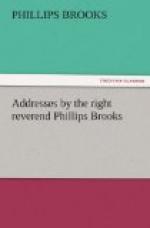As to the moral and mental powers which distinguished him, all embraceable under this general description of clearness of truth, the most remarkable thing is the way in which they blend with one another, so that it is next to impossible to examine them in separation. A great many people have discussed very crudely whether Abraham Lincoln was an intellectual man or not; as if intellect were a thing always of the same sort, which you could precipitate from the other constituents of a man’s nature and weigh by itself, and compare by pounds and ounces in this man with another. The fact is, that in all the simplest characters that line between the mental and moral natures is always vague and indistinct. They run together, and in their best combinations you are unable to discriminate, in the wisdom which is their result, how much is moral and how much is intellectual. You are unable to tell whether in the wise acts and words which issue from such a life there is more of the righteousness that comes of a clear conscience, or of the sagacity that comes of a clear brain. In more complex characters and under more complex conditions, the moral and the mental lives come to be less healthily combined. They co-operate, they help each other less. They come even to stand over against each other as antagonists; till we have that vague but most melancholy notion which pervades the life of all elaborate civilization, that goodness and greatness, as we call them, are not to be looked for together, till we expect to see and so do see a feeble and narrow conscientiousness on the one hand, and a bad, unprincipled intelligence on the other, dividing the suffrages of men.




